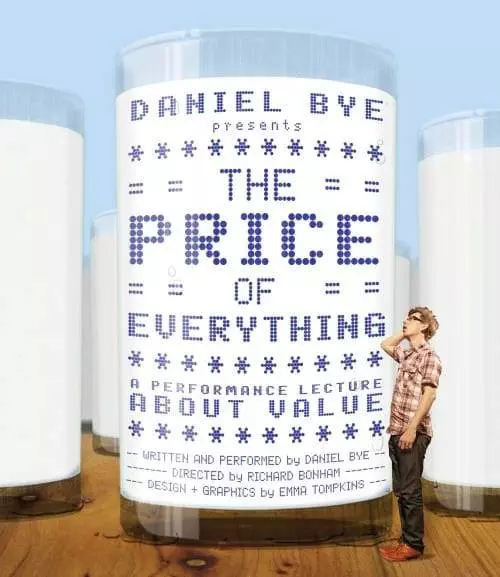In a departure from a cut and paste bit of PR we asked Daniel Bye and Dick Bonham to introduce The Price of Everything by way of interviewing each other. If you want to win tickets to see the performance at The Carriageworks on the 16th September check out the details at the end…
DAN. So what first attracted you to working on this show?
DICK. You asked me to.
DAN. Oh yes. Anything else?
DICK. Well, I’d worked on a show called Hitch by Kieran Hurley, which was about a journey he made to protest at the G8 summit. Quite a socially engaged show, and this struck me (and probably struck you as well) as being in a similar vein.
DAN. But notwithstanding the fact that you’ve worked on a comparable show before, this is essentially a unique theatrical experience?
DICK. It is, it is. It’s. It’s. I’m a bit stuck. In what way is this a unique theatrical experience?
DAN. It’s a performance lecture with facts and figures, but also quite a few jokes. There’s also straightforward storytelling. At times it’s almost a confessional. And there are very rare moments when it feels a bit like standup, and is even quite enjoyable.
DICK. There’s a central material that’s used as a metaphor in the show.
DAN. Milk?
DICK. Milk. Why milk?
DAN. It’s a ubiquitous, catch-all metaphor for value. Whenever there’s a politician in a new department, they always get a radio interview with these catch-you-out questions about their brief. And regardless of the department, one of them is always “how much is a pint of milk”? And they never know the answer, so we’re all invited to mock them. Do you know how much a pint of milk is?
DICK. It’s 38p.
DAN. You know that because it’s in the show.
DICK. Yes.
DAN. But of course, there are all sorts of things that can’t be measured in milk or money, and the show is really about those. So as well as being a quite trite metaphor, the milk is also a really elaborate satire. It’s a very versatile ingredient.
DICK. So tell us a little bit about your process.
DAN. I was about to ask you that.
DICK. OK. So what happens is, Dan sits in a room and tries to be funny for a while
DAN. [hollow laugh]
DICK. And you try and say some things that are interesting. And sometimes I’ll laugh a them or think they’re interesting. And some of those things end up in the show.
DAN. It’s the moments when I surprise myself that I know have to go in.
DICK. But aren’t artists very frustrating when they talk about their process> They talk about what the first idea was, then say “and at the end of it we got this”.
DAN. That’s got nothing to do with process. That’s just an idea and then a miracle.
DICK. Yes, there’s a magic hand-wavy bit in the middle that no-one ever talks about. It involves a lot of sitting around and having a go and false starts and false endings
DAN. And “that bit didn’t quite work” and “maybe it would work if we put a cat in it” and “oh no, it doesn’t work with a cat in it, let’s try a frog”.
DICK. Why do people not talk about this? I suspect it’s because it doesn’t make you look very clever. It involves a lot of getting stuff wrong and having to try again.
DAN. Artists also don’t talk about this bit of the process because we don’t always know how we do it. Our sense of structure and rhythm is physical rather than conscious. And not just artists. As audiences, the show doesn’t smell right if the artists haven’t got the shape right, however good the ideas.
This bit of the interview is a huge hostage to fortune for a show that at the very least gives the appearance of having no structure.And there are a set of rules or guidelines as variously articulated by many many people. But it’s one thing having a sense of what those are, and it’s another thing noticing what those are and applying them in a way which is non-mechanical, leaving space for something to completely blindside you. So what you do is flail blindly towards something that structurally probably obeys the same rules as everything else did. But you can’t use those rules to get there. You have to go with the thing that feels right, rather than going, “in the second half his father must die in order to bring about the act two climax, because that’s what Robert McKee says.
DICK. I guess doing a show is a process of, you just keep going with it until it works, or until you give up and can’t be bothered to make it work any better. Because it could probably always work a little better.
DAN. What’s nice about working on this show is although it’s got a shape to it, there’s quite a lot of space within that shape for me to muck about. For things to change and to work a little better for this audience, tonight. Let’s hope that happens at the Carriageworks.
Fancy winning a pair of tickets? All you have to do, is tell us what you value more than anything. We’ll ask Dick and Dan to draw based on your answers. Winners will be informed of their luck on the 10th September. T’s&C’s apply

hahaaha
how do you enter the draw?
Time!
Spending time with my parents is what I value more than anything.